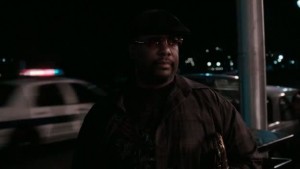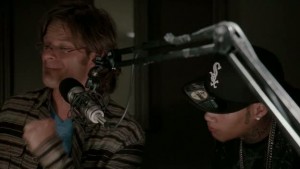Feet First
 People who love New Orleans will tell you there is no place else like it. Even before Katrina, locals would often say it’s not really an American city; that culturally, it’s more Caribbean; that it’s a “third world” city. One of the things that this kind of exceptionalist rhetoric doesn’t allow for is that New Orleans has a lot in common with other American cities, like Baltimore. My friend Melva said this episode reminded her of The Wire–when I got to watch it later I could see why. Residents of large cities all over the US are afraid to testify, threatened by crooked cops, traumatized by violent crime, fleeced by profit-taking speculators, plagued by corrupt governments, sold short by failing school boards. In New Orleans after Katrina, disaster capitalism just speeds up the process and turns over more rocks, more quickly to reveal the vermin below.
People who love New Orleans will tell you there is no place else like it. Even before Katrina, locals would often say it’s not really an American city; that culturally, it’s more Caribbean; that it’s a “third world” city. One of the things that this kind of exceptionalist rhetoric doesn’t allow for is that New Orleans has a lot in common with other American cities, like Baltimore. My friend Melva said this episode reminded her of The Wire–when I got to watch it later I could see why. Residents of large cities all over the US are afraid to testify, threatened by crooked cops, traumatized by violent crime, fleeced by profit-taking speculators, plagued by corrupt governments, sold short by failing school boards. In New Orleans after Katrina, disaster capitalism just speeds up the process and turns over more rocks, more quickly to reveal the vermin below.
“That’s New Orleans, too,” says Antoine as the cop cars speed past him, likely on their way to the scene of Harley’s murder. He means that the city is more than the drunk St. Patrick’s Day revelers walking past; he and Sonny are both answering the question posed in this episode’s title, “What is New Orleans?” Yet Antoine also echoes many of the show’s critics, who complain that the city is more than just the partying, food, music, and tourist sights that appear so often in its episodes. This episode, signaling the season’s stronger emphasis on crime and corruption, might appeal more to those demanding greater verisimilitude and less televisual tourism, to use Lynnell Thomas’s apt expression.
For many in New Orleans there comes a point when we have to answer a difficult question: is living here worth your life or that of your family? Where do you draw the line? What are you willing to risk, to possibly sacrifice, in order to live in such a magical place? Seeing what is still happening to Ladonna and probably more than one person we know in real life, we ask this question. I answered it back in the early 90s, when most people I knew had had a gun stuck in their face or worse. I was lucky in that I was willing and able to leave and make my life in other places once I chose to leave. But many people stay, believing that there is nowhere else they can live–because of their family ties, work, community, and/or a sense of cultural belonging. Like the Midcity homeowner who says, “When I leave this house, it’s going to be feet first.” In the reverse shot, we see not Hidalgo, who is talking to the gentleman, but his cousin the roofer, transfixed by the conversation. The slow zoom into his closeup emphasizes the emotional power of the man’s ferocious love of his home. A commitment, a conscious choice that this will be where I die, also characterizes Harley, who does indeed die in this episode in the gritty realism we have come to expect from George Pelecanos. If the show had seemed too touristic, this brutal episode offers a possible counter-balance to that.
 On the other hand, for those seeking more verisimilitude, I give you the Davis character. So many criticisms of the show focus on what an ass the character of Davis McAlary is. Yet I have to say, Davis is an integral part of the “realism” of the show as well. To paraphrase from a comment thread on an earlier post, I think Davis’s character personifies the enduring and ever-adapting tradition of white supremacy in New Orleans, in this case the music scene. Davis sees his new label, funded by his eccentric Garden District aunt, as a vehicle for his overtly political music that he hopes will speak to the New Orleans public–perhaps the way Creighton Bernette’s YouTube rants gained a local following. A fool’s errand, as Sound of Treme blog points out. New Orleans music has always been “political” but not usually in overt ways; more often it takes the form of “feel good music” to express resistance indirectly.
On the other hand, for those seeking more verisimilitude, I give you the Davis character. So many criticisms of the show focus on what an ass the character of Davis McAlary is. Yet I have to say, Davis is an integral part of the “realism” of the show as well. To paraphrase from a comment thread on an earlier post, I think Davis’s character personifies the enduring and ever-adapting tradition of white supremacy in New Orleans, in this case the music scene. Davis sees his new label, funded by his eccentric Garden District aunt, as a vehicle for his overtly political music that he hopes will speak to the New Orleans public–perhaps the way Creighton Bernette’s YouTube rants gained a local following. A fool’s errand, as Sound of Treme blog points out. New Orleans music has always been “political” but not usually in overt ways; more often it takes the form of “feel good music” to express resistance indirectly.
The “truth” of Treme’s New Orleans is at its best a heady cocktail of tourist delights, urban decay, trauma and corruption, and glimmers of progress as the city struggles to adjust to the new normal.



This is beautifully written and expresses the show’s complexity regarding the city. Nice work, and I look forward to reading more of your posts.
You’re right. This episode’s portrayal of the other New Orleans is exactly the type of complexity and critical reflexivity that I have been calling for.
I do feel compelled to clarify my critique of McAlary’s character, however. It’s not that McAlary is an asshole that I find disturbing (Some of my favorite characters – and friends – are assholes). It’s how the series’ other characters (and by extesnion the series itself) has mostly acquiesced to his ridiculous demands and excused his most egregious behavior. Contrary to your reading, I don’t think that the series has alwyas signaled viewers to be horrified – or even humored – by Davis’ shenanigans.
While I joined your gleeful satisfaction with Lil Calliope’s strategic (even political) advocacy of “The Truth,” I still wondered about the series’ silence around the proliferation of post-Katrina bounce music that was both political and dance music. Lil Calliope (as well as McAlary) would have certainly been aware of – and probably influenced by – Fifth Ward Weebie, Mia X, Lil Wayne, Juvenile and others who fused New Orleans bounce music with scathing criticism (http://www.foxnews.com/story/0,2933,210845,00.html), highlighting, as this episode does, the pathos and humor of living in New Orleans.